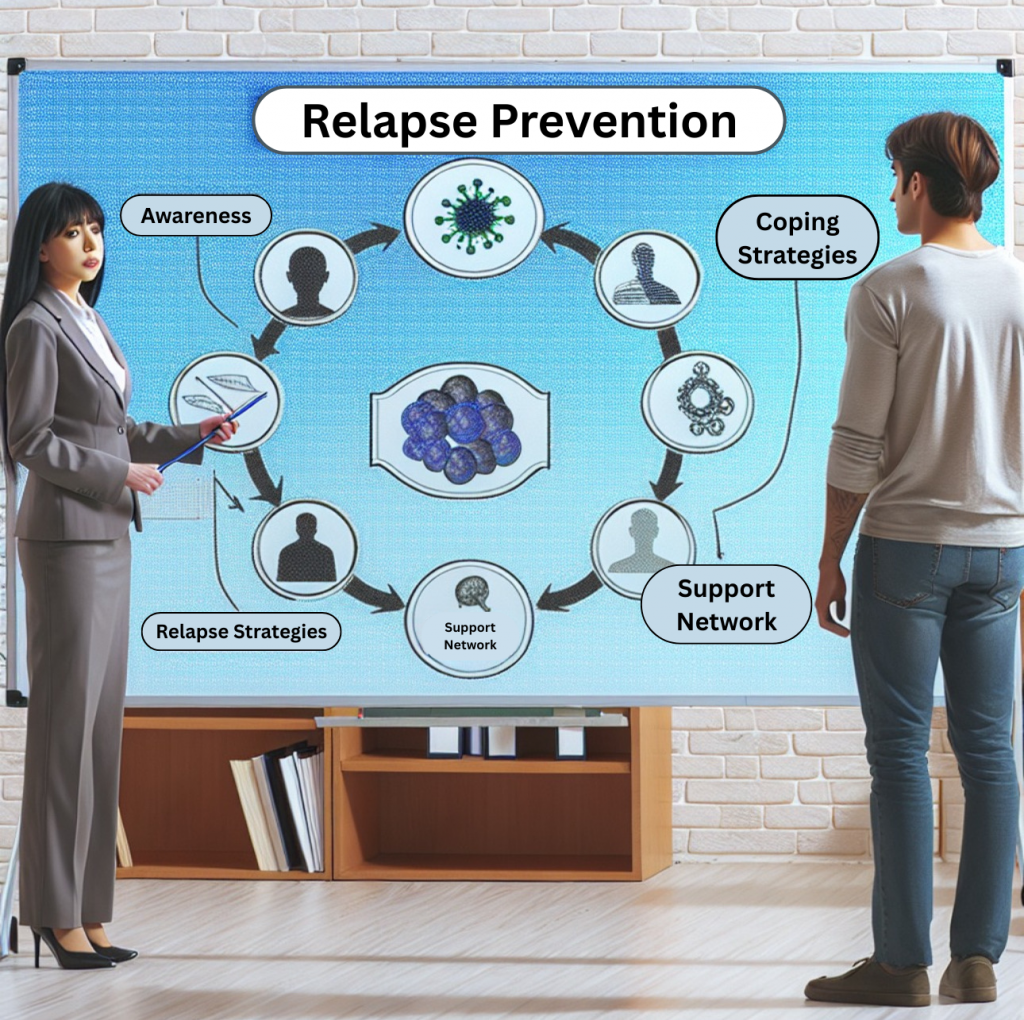Navigating the path to recovery from addiction is like embarking on a roller coaster ride, full of thrilling highs and a few gut-wrenching lows. And let’s be real—one of the most challenging parts of the journey is facing the lurking enemy of relapse or relapse prevention. I remember chatting with a dear friend who was beaming after hitting the six-month sobriety milestone. But, as he entered a family gathering, the smell of beer wafted through the air, and the sound of clinking glasses suddenly launched him into the nostalgia tornado of temptation. Surprise! Temptation knows how to crash parties, even when you’re in the coziest comfort zone.
Relapse prevention isn’t just a buzzword; it’s your trusty sidekick on your journey toward lasting recovery! Spoiler alert: it’s not simply about dodging substances; it’s about crafting a strong mindset and a vibrant lifestyle that keep those pesky relapses at bay.
Understanding Relapse Prevention
So, what does “relapse” even mean in the context of addiction? It’s basically a “hey, remember me?” moment with substances after a period of sobriety. Here’s where relapse prevention strategies come in—these gems remind us that recovery is about more than just saying “no” to old habits. It’s about creating a life filled with joy and resilience. It involves recognizing and managing the stages of relapse: those sneaky emotional triggers (like feeling overwhelmed), mental triggers (those thoughts about using that creep in), and, of course, physical triggers (the act of actually using).
Common Triggers for Relapse
Now, here’s the scoop—life likes to throw a few curveballs that can trigger a relapse. Awareness is your secret weapon! Here are some common culprits:
- Stress and Anxiety: Ah, life’s pressures can make it all too tempting to revert to old habits. 🥴
- Social Situations: Parties and gatherings can sometimes feel like a game of dodgeball, especially with alcohol lounging around.
- Environmental Cues: Places tied to past substance use can trigger cravings faster than you can say “no thanks.” 🚫
- Loneliness and Boredom: Let’s face it—being bored can lead you right into the arms of old habits.
- Emotional Distress: Feeling angry or sad? Those emotions can send you running straight to your past coping mechanisms.
- Peer Pressure: The urge to conform can sometimes feel stronger than that urge to binge-watch your favorite show.
- Major Life Changes: Job loss or relationship drama can throw a serious wrench in your recovery plans. 💔
- Celebrating Achievements: Misguided celebrations can lead to the “I can handle just one” trap—spoiler alert: it rarely stops at one!
- Availability of Substances: When substances are knocking at your door, it’s a big “uh-oh” moment.
- Underestimating Addiction’s Power: Feeling overly confident can set you up for an unexpected trip down memory lane.
Key Strategies for Effective Relapse Prevention
Fear not! You’re not alone in your battle against relapse. Here are some nifty strategies for supercharged relapse prevention:
1. Create a Strong Support Network
Your support squad is vital! Think of it as assembling an Avengers team, minus the capes (unless that’s your thing). Joining support groups like Alcoholics Anonymous (AA) or Narcotics Anonymous (NA) helps you connect with fellow warriors who really understand the journey. Don’t forget to share your wins and struggles with close friends and family—they’re cheering for you!
2. Identify and Avoid Triggers
Knowing your triggers is like having a treasure map for avoiding danger. Create a plan for high-risk situations—like heading to that party where your high school nemesis might show up—and adapt your routine to steer clear of anything that could send you spiraling.
3. Develop Healthy Coping Mechanisms
Swap out harmful habits for healthy ones. Dive into mindfulness practices, get your groove on with yoga or hiking, or unleash your creativity through art or music. Find what lights you up and stick with it!
Building a Fulfilling Life in Recovery
Creating a vibrant life in sobriety is a total game-changer! Dive into new hobbies, volunteer your time, and establish a self-care routine that would make even a wellness influencer proud. Set personal goals—whether job-related or educational—and don’t forget to indulge in adventures, like exploring new places (hello, spontaneous road trip!). As you cultivate meaningful relationships and connect with nature, you’ll find positivity and purpose swelling up in your heart. Remember to celebrate every little achievement—none are too small because every tiny step is a giant leap toward success! 🎉
The Role of Sober Living Homes in Relapse Prevention
Ever considered calling a sober living home your new home? These gems can significantly boost your relapse prevention efforts. They offer a supportive environment loaded with accountability, counseling access, and job placement services. Plus, living among peers focused on similar goals fosters encouragement like a cozy blanket that just makes you feel good!
Inspiring Success Stories in Relapse Prevention
Let’s sprinkle in some inspiration! Think of Sarah, who found her strength after many attempts to maintain her sobriety. Through group therapy and diving into her newfound passions, she learned to dance through life’s challenges with grace. Her story is a reminder that the road to recovery can be bumpy, but with determination, success is within reach.
Come On, Let’s Do This!
So here’s the bottom line: relapse prevention isn’t just about dodging the temptation; it’s a proactive way of living that comes with awareness, laughter, and lots of support. If you find yourself struggling, it’s okay to reach out for help. Remember, recovery is a journey, and each day brings fresh opportunities for growth and resilience.
Let’s keep the conversation going! We want to hear your stories, your tips for staying sober, or even just your favorite sober moments. If you’d like to learn more about our sober living programs and resources at Resilient Home Living, give us a shout! Every step forward is a step worth celebrating, and remember, you’re absolutely not alone on this wild, beautiful journey.

